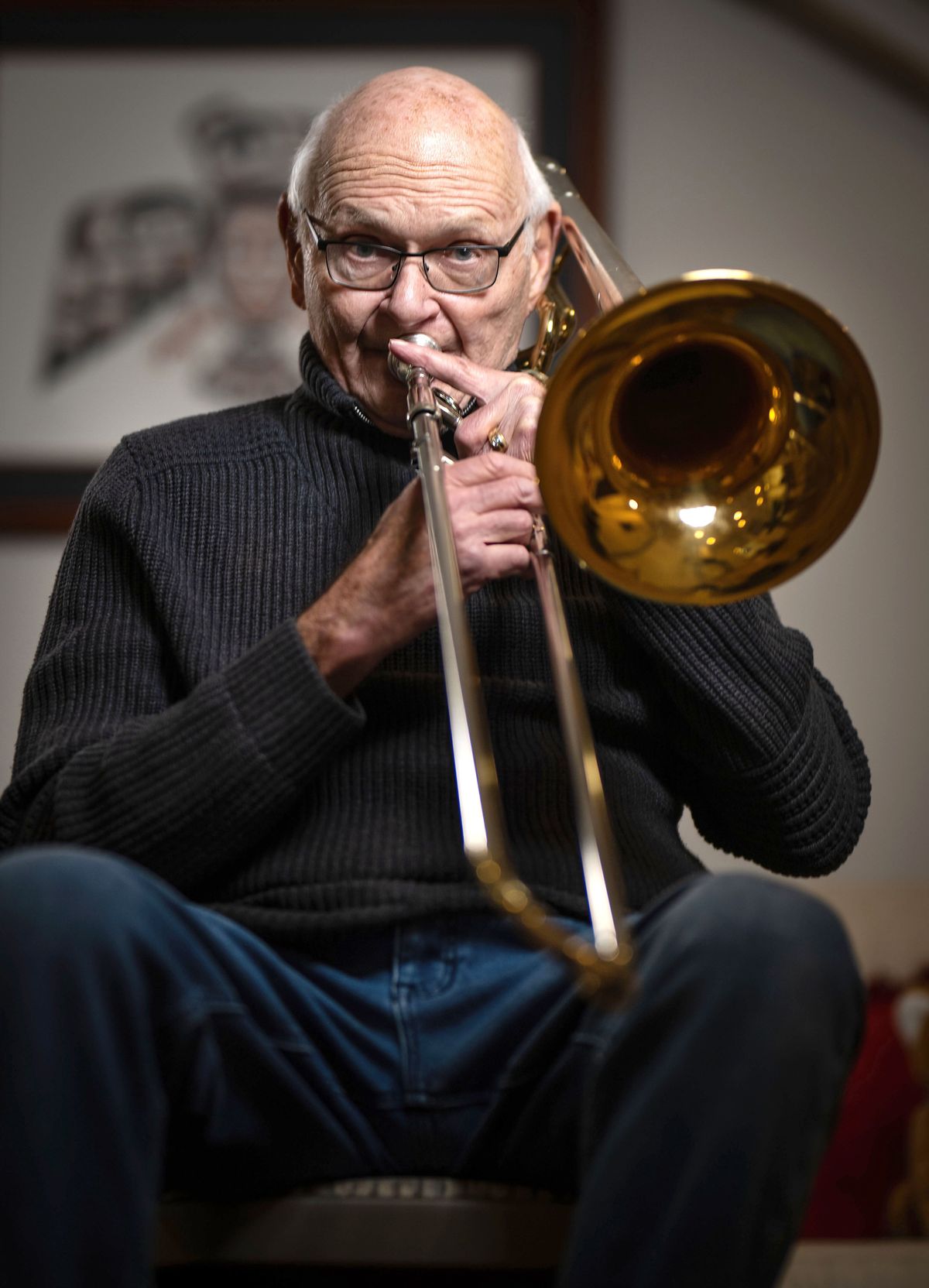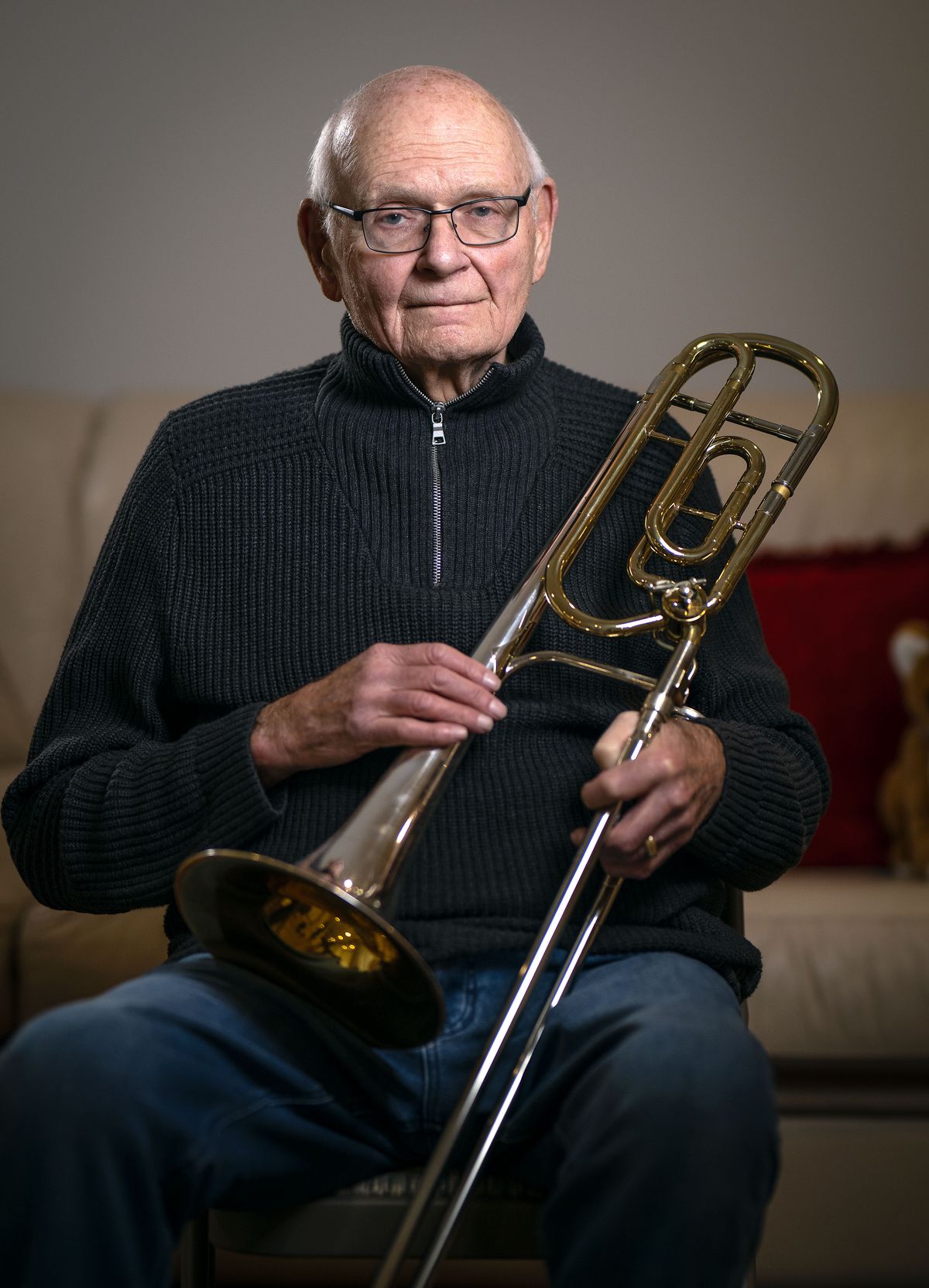Liberty Lake man’s Alzheimer’s disease stops progressing after drug trial
John Haldi, who had early-stage Alzheimer’s, participated in a local Aduhelm study. By July 2023, based on testing, neurologist Dr. Greeley told him he no longer has amyloid plaques to meet diagnosis for Alzheimer’s. There are still short-term memory issues, but Haldi is traveling, doing puzzles and playing trombone in the Project Joy Orchestra. (COLIN MULVANY/THE SPOKESMAN-REVIEW)
John Haldi had early-stage Alzheimer’s disease when he began a local Aduhelm drug study in June 2020.
For three years, he underwent monthly infusions when, in July 2023, he no longer met the criteria to be diagnosed with Alzheimer’s disease.
His doctor, neurologist David Greeley, said Haldi had normal amyloid levels. Beta-amyloid are protein pieces that gradually clump together and form plaques, a hallmark sign of the disease that for many leads to a slippery slope into memory care and death.
Nearly 7 million Americans have Alzheimer’s.
“I truly believe that he was one of the lucky ones,” Greeley said of Haldi. “I’ll put a big caveat in here that not everyone did this well on this study.”
Aduhelm never received the Food and Drug Administration’s nod to enter the market. Greeley, however, said the agency recently approved two similar antibody intravenous infusion drugs that remove beta-amyloid from the brain: Leqembi and Kisunla.
The newer drugs carry risks and possible side effects, but they’re considered “disease-modifying” for people who qualify, according to the Alzheimer’s Association.
Today, Haldi is traveling, finishing puzzles, dancing and playing trombone in the Project Joy Orchestra. Turning 85 next month, he still struggles with short-term memory loss but can be left alone safely in his Liberty Lake home, said his wife, Pat Haldi.
She said he’s shown slow but noticeable changes in his memory and cognitive function. Recently, when she couldn’t remember a new bankcard pin number to get out cash, she shared her frustration with him when returning to the car. He quickly told her what the new code was.
John Haldi also has gone back to fixing items around the house, she said. They have trips planned to Mexico and for an Alaskan cruise later.
Pat Haldi said their story may offer some hope, although only a small number of people improved on the drug. Mainly, she urges people to seek early diagnosis.
“When we went first to an Alzheimer’s support group in 2015, the meeting coordinator said, ‘Well, you should now start making rounds to see where you want to put your person in memory care because it will be just in a few years before you’ll need to make those changes,’ ” she said. “I was in shock about, what are we going to do? I’m thinking about $10,000 a month for care.”
At that time, John Haldi had been diagnosed with early brain atrophy dementia.
“Now, at this point, we’re not going to have to look at that,” she added. “He’s plateaued. He’s independent with his hygiene. He can fix his breakfast. He can stay by himself. He’s safe. He even mows the lawn. He fixes things. It’s amazing.
“He has short-term memory loss still, but it’s workable. I just write him a note about where I’m going. Then he’ll call me if he needs something. One time, he went to orchestra practice when a friend drove him, and he didn’t have the key to the house. He called me up and told me he didn’t have the key and that he’d forgotten it, but he knew he forgot it. This time today, he made sure he had the key, had money for lunch.”
There’s another stark difference from eight years ago. Their support group started with almost 50 members, and that included Alzheimer’s patients and their spouses. They grew close through meetings, potlucks and activities. It’s now mostly dissolved because a majority of those with the disease have since died or gone into memory care, she said.
On Tuesday, John Haldi spent part of the day with an orchestra friend who drives them both. They went to lunch after a practice, and then to the Haldis’ house to play some duets. He still doesn’t drive, because Alzheimer’s is on his medical records and for safety, his wife said.
“She doesn’t let me drive,” John Haldi quipped, when he heard her say that. But lately, she said he’s been pointing out to her directions to their destinations.
They also often go dancing and to a balloon badminton activity. He still can play tunes by memory and reads music.
“We practice orchestra on Tuesday mornings every week,” he said. “We go into different retirement facilities to play. I’ve been playing trombone since fifth grade.”
A former math teacher, he graduated from Rogers High School in 1957. After getting a master’s degree from Washington State University, John Haldi worked at schools in the Seattle area before moving back to Spokane, where he mainly taught at Spokane Community College.
That’s where he met Pat. They’ve been married 40 years, a second marriage for both. She worked at St. Luke’s Rehabilitation for 25 years as a certified diabetic expert and rehab nurse.
Greeley said his Northwest Neurological practice offers a new blood test for Alzheimer’s diagnosis that costs about $250 and is not covered by insurance. Two other diagnostic procedures are a lumbar puncture for a sample of fluid from the spine or an amyloid PET scan.
John Haldi likely still has some dementia, Greeley said. But he recently took a 30-question memory test called the mini-mental to check for cognitive impairment and scored near the top, much like he did in 2018. Previously, he’d slipped several points.
On a normal trajectory with the disease, he would be much worse without an intervention, Greeley added.
“There is no way he could have lived to today if we hadn’t done anything,” he said. “There is no doubt he had Alzheimer’s, because he fit all the criteria to be in the study. I can’t even describe to you enough about how amazing that is, that this person is still alive, engaged, traveling, recognizes his wife, is playing the trombone and doing all kinds of things. I’d be happy to be doing all that at 74, let alone 84.”

